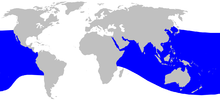| Ginkgo-toothed beaked whale | |
|---|---|

| |

| |
| Size compared to an average human | |
| Scientific classification | |
| Domain: | Eukaryota |
| Kingdom: | Animalia |
| Phylum: | Chordata |
| Class: | Mammalia |
| Order: | Artiodactyla |
| Infraorder: | Cetacea |
| Family: | Ziphiidae |
| Genus: | Mesoplodon |
| Species: | M. ginkgodens
|
| Binomial name | |
| Mesoplodon ginkgodens Nishiwaki and Kamiya, 1958
| |

| |
| Ginkgo-toothed beaked whale range | |
The ginkgo-toothed beaked whale (Mesoplodon ginkgodens) is a poorly known species of whale even for a beaked whale, and was named for the unusual shape of its dual teeth. It is a fairly typical-looking species, but is notable for the males not having any scarring.[3]
Contents
Description
[edit]
Ginkgo-toothed beaked whales are more robust than most mesoplodonts, but otherwise look fairly typical. Halfway through the jaw, there is a sharp curve up where the ginkgo leaf-shaped tooth is.
Unlike other species such as Blainville's beaked whale and Andrews' beaked whale, the teeth do not arch over the rostrum. The beak itself is of a moderate length.
The coloration is overall dark gray on males with light patches on the front half of the beak and around the head, and small white spots on the bottom of the tail, but the location may be variable. Females are a lighter gray and have countershading.
Both sexes reach 4.9 meters (16 feet) in length. They are around 2.4 meters (7.9 feet) long when born.
Population and distribution
[edit]This beaked whale has had fewer than 20 strandings off the coasts of Japan, Taiwan,[4] California, the Galapagos Islands, New South Wales, New Zealand, Sri Lanka, the Maldives, and the Strait of Malacca.[5] Its range is essentially tropical and temperate waters in the Indian and Pacific Ocean. There are currently no population estimates.
A potential sighting occurred in the South China Sea in May 2019, although it was possible the sighted whales were Deraniyagala's beaked whales.[6][7] In February 2021, a pod of three whales was sighted at the Parengarenga Canyons, off North Cape (Otou), New Zealand.[8][9]
Behavior
[edit]Unlike all other known members of Ziphiidae, there is no evidence that the males engage in combat, although this may be due to a limited sample size. The species probably feeds primarily on squid.[10] No other information is known.
Conservation
[edit]The only observations of this species while alive have come from hunters off the coasts of Japan and Taiwan, who occasionally take an individual. They are also affected by drift gillnets. One individual, identified from a DNA sample, was known to have interacted with a pelagic longline fishery in the central and western Pacific Ocean. The ginkgo-toothed beaked whale is covered by the Memorandum of Understanding for the Conservation of Cetaceans and Their Habitats in the Pacific Islands Region (Pacific Cetaceans MOU).[11]
Specimens
[edit]- MNZ MM002618/1, collected Pakawau, Golden Bay, New Zealand, 2004.
See also
[edit]References
[edit]- ^ Pitman, R.L.; Brownell Jr.; R.L. (2020). "Mesoplodon ginkgodens". IUCN Red List of Threatened Species. 2020: e.T127827012A127827154. doi:10.2305/IUCN.UK.2020-3.RLTS.T127827012A127827154.en. Retrieved 19 November 2021.
- ^ "Appendices | CITES". cites.org. Retrieved 2022-01-14.
- ^ Nishiwaki, M.; Kasuya, T.; Kureha, K.; Oguro, N. (1972). "Further comments on Mesoplodon ginkgodens" (PDF). Scientific Reports of the Whales Research Institute. 24: 43–56. Retrieved 26 February 2019.
- ^ 黃力勉, 2014, 5.1米柯維氏喙鯨 擱淺蘭嶼. 台東報導
- ^ Dalebout, Merel Louise (2002). Species identity, genetic diversity, and molecular systematic relationships among the Ziphiidae (beaked whales). ProQuest: The University of Auckland (New Zealand). p. 249.
- ^ Hansen, Cypress (14 January 2021). "Rare beaked whale sighting could be a world first for the species". Mongabay. Retrieved 29 January 2021.
- ^ Rosso, Massimiliano; Lin, Mingli; Caruso, Francesco; Liu, Mingming; Dong, Lijun; Borroni, Anna; Lin, Wenzhi; Tang, Xiaoming; Bocconcelli, Alessandro; Li, Songhai (2 December 2020). "First live sighting of Deraniyagala's beaked whale (Mesoplodon hotaula) or ginkgo-toothed beaked whale (Mesoplodon ginkgodens) in the western Pacific (South China Sea) with preliminary data on coloration, natural markings, and surfacing patterns". Integrative Zoology. 16 (4): 451–461. doi:10.1111/1749-4877.12507. PMID 33289310. S2CID 227947326.
- ^ "Scientists photograph rare ginkgo-toothed beaked whale". RNZ. 2021-02-05. Retrieved 2021-02-05.
- ^ "Rare whale spotted swimming for first time ever in New Zealand waters". NZ Herald. Retrieved 2021-02-05.
- ^ MacLeod, Colin (January 1998). "Intraspecific scarring in odontocete cetaceans: an indicator of male 'quality' in aggressive social interactions?". Journal of Zoology. 244: 71–77. doi:10.1111/j.1469-7998.1998.tb00008.x – via Wiley Online Library.
- ^ Official webpage of the Memorandum of Understanding for the Conservation of Cetaceans and Their Habitats in the Pacific Islands Region
- Taylor, B.L.; Baird, R.; Barlow, J.; Dawson, S.M.; Ford, J.; Mead, J.G.; Notarbartolo di Sciara, G.; Wade, P. & Pitman, R.L. (2008). "Mesoplodon ginkgodens". IUCN Red List of Threatened Species. 2008: e.T13246A3427970. doi:10.2305/IUCN.UK.2008.RLTS.T13246A3427970.en. Retrieved 12 January 2018. Database entry includes a brief justification of why this species is of data deficient.
- Encyclopedia of Marine Mammals. Edited by William F. Perrin, Bernd Wursig, and J.G.M Thewissen. Academic Press, 2002. ISBN 0-12-551340-2
- Sea Mammals of the World. Written by Randall R. Reeves, Brent S. Steward, Phillip J. Clapham, and James A. Owell. A & C Black, London, 2002. ISBN 0-7136-6334-0
External links
[edit]| Mesoplodon ginkgodens |
|
|---|---|
